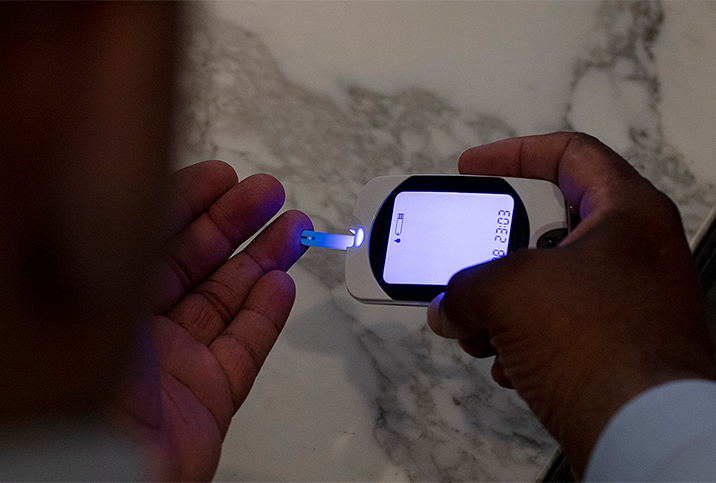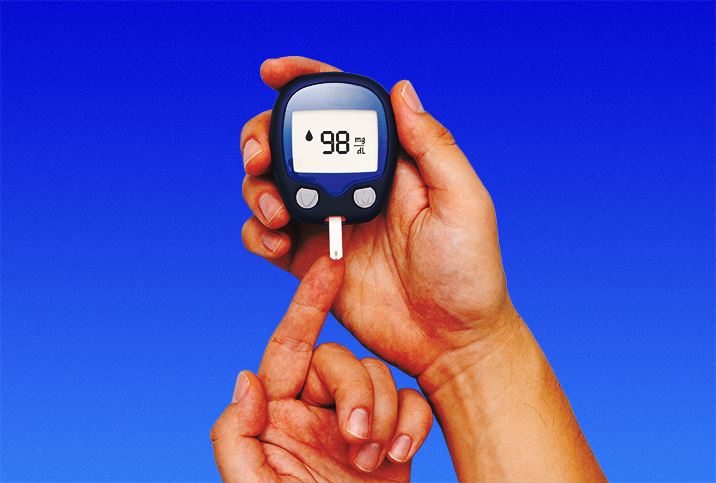Living With Diabetes and ED

An estimated 34.2 million people, or about 10.5 percent of the population, have diabetes, according to the 2020 Diabetes Statistics Report by the Centers for Disease Control and Prevention (CDC). Men have a slightly higher risk for diabetes than women, which is believed to be because of insulin sensitivity and belly fat storage.
If you are living with diabetes, then it's likely you've experienced erectile dysfunction (ED). ED occurs when you have trouble achieving and maintaining an erection. If blood sugar is not properly controlled, the blood vessels and nerves responsible for blood to flow to the penis during sexual arousal can be damaged.
Overview of diabetes and ED
ED is not the occasional failure to get and keep an erection, but rather a recurring inability.
Diabetes contributes to ED in several ways, and many complications arise from having diabetes.
Nerve damage (neuropathy) is often one of the first signs of diabetes, and while it typically affects the lower extremities (feet and legs), neuropathy can occur in any part of your body, including the genitals. Nerve damage suffered from diabetes cannot be reversed, but you can take steps to slow its progression.
Another complication of diabetes that can cause ED is blood vessel damage. The smallest blood vessels, like those in the penis, are most susceptible to damage. There is a strong link between diabetes and heart disease, so if you have heart disease, too, your blood vessels can suffer further damage.
When your blood vessels are damaged, either through blockages or constriction, blood cannot freely flow throughout your body, including to your penis when you are sexually aroused.
Diabetes can also cause kidney disease. Your kidney plays a role in hormone production, and when it is damaged, the hormones associated with sexual response are either chemically altered or not produced in adequate amounts.
Another diabetes complication can be low testosterone production. Testosterone is the hormone responsible for male characteristics and sexual desire. Men who have diabetes are twice as likely to have low testosterone levels as men without diabetes. Low testosterone levels result in a decreased desire for sex, which can lead to ED.
Daily effects and impacts of diabetes
Managing diabetes is a day-in, day-out process. If you have insulin-dependent diabetes (type 1 or type 2), then managing blood sugar levels becomes a driving force for everything you do throughout the day. Diabetes management requires consistent monitoring of blood sugar levels. Typically, people use either a glucose meter or a glucose monitoring system.
Many people with insulin-dependent diabetes have more than one type of insulin they take daily to keep blood sugar levels stable. Doses of these different types of insulins must be continually adjusted to the blood sugar readings.
Food and drinks also become a daily focus when you have diabetes. If your blood sugar levels drop too low, you need food on hand to get it back up. When you shop for groceries or prepare meals, you have to be aware of the carbohydrate and sugar content of all the food you buy and cook.
Another daily impact of diabetes is fear of the disease and concern about certain scenarios. For instance, what if you're alone and your blood sugar levels climb so high you suffer a stroke? What if your blood sugar drops so low you enter a coma?
While those are extreme and rare outcomes of diabetes, they're daily possibilities. Fear can be paralyzing and cause quality of life to quickly deteriorate.
Sex and relationships with diabetes and ED
When you have diabetes and ED, your sex life and relationships will be adversely affected. From low testosterone levels that leave you with little desire for sex to the overshadowing prospect of not being able to maintain an erection when you do have sex, frustration will be one of the first feelings you and your partner will experience.
Anger may be close behind because sexual intimacy is an integral part of any relationship. When intimacy seems less likely, you and your partner may get mad and take it out on each other.
Problems with sexual intimacy can lead to other problems in your relationship. As frustration and anger mount because of diabetes and ED, you and your partner may discover you are fighting and arguing about everything in your relationship.
Guilt can also develop. You may feel guilty about having diabetes and ED, which in turn lets your partner down when you both want to have sex. Your partner may feel guilty about being angry at you because you have a serious disease you did not ask for or want.
Frustration, anger and guilt are common feelings when you have diabetes and ED. However, they do not have to destroy your relationship.
If you are having trouble managing the emotional hardships of diabetes and ED, consult your doctor or a therapist. Help is available for managing your feelings, diabetes and ED.
Managing diabetes and ED
If you and your partner are experiencing emotional distress because of your diabetes and ED, get some professional counseling from a therapist who specializes in sexual disorders. Both of you need validation of your feelings, but you also need practical ways to deal with them and move forward together.
You can successfully manage your diabetes day to day unless you experience unusual health changes that require a total readjustment. The biggest problem most people have with diabetes is the sense of deprivation with regard to certain foods, which can evolve into lapses in willpower when they encounter food triggers, such as stress.
As with any other major change in life, successfully managing diabetes includes changing habits. For instance, if you love chocolate ice cream, then find a low-carbohydrate, low-sugar chocolate ice cream.
If your prediabetes response to stress was to drown yourself in "comfort food," find another method of relief. Take a walk around the block a few times or listen to music that moves your soul or work on a hobby you enjoy. These are healthy ways to relieve stress and keep your blood sugar levels stable.
Eating a nutritious diet will help you successfully manage your diabetes. Include lean meats, beans and eggs as protein sources, and abundant amounts of fresh vegetables. You can include some whole grains and fruits, but you need to be aware of their potential impact on your blood sugar.
Regular exercise is another key to successfully managing diabetes and will help you take off unwanted weight, another factor in diabetes.
Talk with your primary care doctor, who can go over different options to treat your ED. Before you decide, also talk about potential treatments with your partner so you can make the decision together.
Treatments for ED include:
- Oral drugs (Stendra, Cialis, Viagra and Levitra)
- Testosterone therapy (for low testosterone levels)
- Penile injections (intracavernosal alprostadil)
- Intraurethral medicine (alprostadil)
- Vacuum constriction devices (placed over the penis to create blood flow)
- Penile implants (implants you control to get and lose an erection)
Resources for living with diabetes and ED
The American Diabetes Association is a great resource for managing and living with your diabetes.
Talk with your primary care doctor about adding a diabetes nutritionist and a diabetes counselor to your medical team. A diabetes nutritionist can provide you with detailed information about what foods you should and should not eat, along with menu plans including healthier swaps for foods you enjoy but that may not be good for your diabetes.
A diabetes counselor is a pharmacist who can monitor your blood sugar levels (by email or online access) and fine-tune or change the amount or type of insulin you are taking for stabilization.
You will be working with people, usually on a weekly basis, who know what they're doing and can help keep your blood sugar levels as close to normal as possible.
Even though you have diabetes and ED, diagnosis of each can spur healthy lifestyle changes in diet, nutrition, exercise and mental health awareness.


















